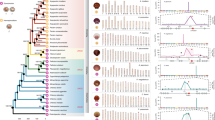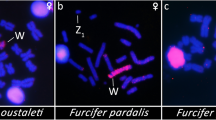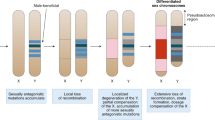Abstract
In birds, the female is the heterogametic sex and the sex-determining system is referred to as ZZ/ZW. In mammals the male is heterogametic, and the sex-determining system is referred to as XX/XY. The mammalian X chromosome appears to have been conserved largely intact during evolution. Thus the structural gene loci for glucose-6-phosphate de-hydrogenase, phosphoglycerate kinase, α-galactosidase and hypoxanthine–guanine phosphoribosyltransferase are situated on the X chromosome of a wide variety of mammals. In addition, mammals show ‘dosage compensation’; that is, although females possess two doses of each X-linked gene while males possess only one, females produce the same level of gene product as males. In birds, cytological studies and data on sex-linked morphological mutants suggest that1 the Z chromosomes of all birds are homologous, and that buds do not show dosage compensation for sex-linked genes. Ultimate proof of these hypotheses requires the discovery of proteins whose structural gene loci are encoded by the Z chromosome of birds1, none of which has previously been found. Here we report that the cytoplasmic isozyme of aconitase is Z-linked in the guinea fowl and probably Z-linked in the domestic fowl, house sparrow and two species of cockatoos, thereby providing evidence for Z-chromosome homology in birds. We also show that there is an apparent lack of dosage compensation for cytoplasmic aconitase in the domestic fowl, house sparrow and spotted turtledove.
This is a preview of subscription content, access via your institution
Access options
Subscribe to this journal
Receive 51 print issues and online access
$199.00 per year
only $3.90 per issue
Buy this article
- Purchase on Springer Link
- Instant access to full article PDF
Prices may be subject to local taxes which are calculated during checkout
Similar content being viewed by others
References
Ohno, S. Sex Chromosomes and Sex-linked Genes (Springer, New York, 1967).
Baverstock, P. R., Watts, C. H. S., Adams, M. & Gelder, M. Aust. J. Zool 28, 553–574 (1980).
Harris, H. & Hopkinson, D. A. Handbook of Enzyme Electrophoresis in Human Genetics (North-Holland, Amsterdam, 1976).
Lake, P. E. & Stewart, S. M. Ministry of Agriculture, Fisheries & Food Bulletin 213 1978).
Fechheimer, N. S. & Jaffe, W. P. Nature 211, 773–774 (1966).
Cam, A. E. & Cooper, D. W. Biochem. Genet. 16, 261–270 (1978).
Lyon, M. F. Biol. Rev. 47, 1–35 (1972).
Lucchesi, J. C. A. Rev. Genet. 7, 225–237 (1973).
Johnson, M. S. & Turner, J. R. G. Heredity 43, 71–77 (1979).
Ruse, I. A. & O'Connell, E. L. J. biol. Chem. 242, 1870–1879 (1967).
Cleland, W. W., Thompson, V. W. & Harden, R. E. Meth. Enzym. 13, 30–32 (1969).
Lowry, O. H., Rosebrough, N. J., Farr, A. L. & Randall, R. J. J. biol. Chem. 193, 265–275 (1951).
Author information
Authors and Affiliations
Rights and permissions
About this article
Cite this article
Baverstock, P., Adams, M., Polkinghorne, R. et al. A sex-linked enzyme in birds—Z-chromosome conservation but no dosage compensation. Nature 296, 763–766 (1982). https://doi.org/10.1038/296763a0
Received:
Accepted:
Issue Date:
DOI: https://doi.org/10.1038/296763a0
This article is cited by
-
Transcriptome analysis revealed potential mechanisms of differences in physiological stress responses between caged male and female magpies
BMC Genomics (2019)
-
Avian transcriptomics: opportunities and challenges
Journal of Ornithology (2018)
-
Evolution of vertebrate sex chromosomes and dosage compensation
Nature Reviews Genetics (2016)
-
X chromosome regulation of autosomal gene expression in bovine blastocysts
Chromosoma (2014)
-
Genome-wide annotation and analysis of zebra finch microRNA repertoire reveal sex-biased expression
BMC Genomics (2012)
Comments
By submitting a comment you agree to abide by our Terms and Community Guidelines. If you find something abusive or that does not comply with our terms or guidelines please flag it as inappropriate.



